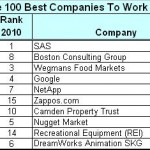Fortune magazine is out with its annual list of 100 Best Companies To Work For and the names there are recognizable to anyone keeping track.
SAS, the North Carolina software giant, is No. 1 for the second year in a row. The company, with on site childcare, health care, employee gym, and more — lots more — is a regular. It has made the list for the last 14 years.
Wegman’s Food Markets, and Google, Net App, and Boston Consulting are all still in the top 10. Zappos, the much-admired shoe company now owned by Amazon, and REI, the camping and outdoor recreation provisioner, are the only newcomers. Zappos is 6th and REI 9th on the 2011 list.
Edward Jones, the financial adviser, and Qualcomm, the wireless technology company, which were the two companies displaced from 2010?s top 10. Jones slipped only slightly to 12th. But San Diego-Based Qualcomm slid all the way to 33rd place.
Not easy to make the list
Why? It isn’t explained in the magazine’s articles on the list and the companies who make it.
The Great Place to Work Institute is the non-profit that compiles the Fortune list. It has some of the stringiest criteria, basing its selection of its top 100 companies on multiple factors, but relying heavily on its “Trust Index.” “A great place to work,” says the Institute, “is one in which you ‘trust the people you work for, have pride in what you do, and enjoy the people you work with’.”
 It’s not easy to make the top 100 list. More than 1,000 companies submit applications each year hoping to make the Fortune list, says Amy Lyman, Director of Corporate Research and a co-founder of the Institute. More vie for a placement on lists for small and mid-sized companies.
It’s not easy to make the top 100 list. More than 1,000 companies submit applications each year hoping to make the Fortune list, says Amy Lyman, Director of Corporate Research and a co-founder of the Institute. More vie for a placement on lists for small and mid-sized companies.
Companies go through a fairly rigorous process that includes extensive employee and management surveys, analyses of employee engagement, and the development of the Trust Index. The Index measures what the Institute believes are the cornerstones of a great place to work: Credibility, Respect, Fairness and Pride and Camaraderie.
For a company making the list, the rewards are more than simply pride and a marketing opportunity.
“A competitive advantage in attracting top talent”
Sean Broderick, VP, National Business Development for Bernard Hodes Group, says a Fortune ranking “add immediate awareness and validation. It’s 3rd party validation of your branding message.”
“For a regional employer, that’s a benefit they can’t buy. It gives you a competitive advantage in attracting top talent because an outside organization is saying you are a good place to work. So you’ll get the pick of the talent,” says Broderick.
There’s also a financial correlation. Say Lyman, “We have found that companies that have a high trust also tend to be more successful.”
Russell Investments, the financial consulting firm that developed the Russell 3000, began tracking the financial performance of the 100 Great Place companies several years ago. Over a 12-year period (1998-2009) companies on the list outperformed both the S&P 500 and Russell’s own 3000.
